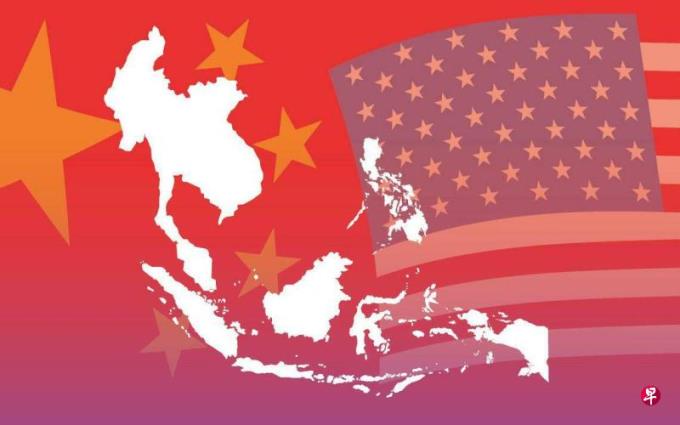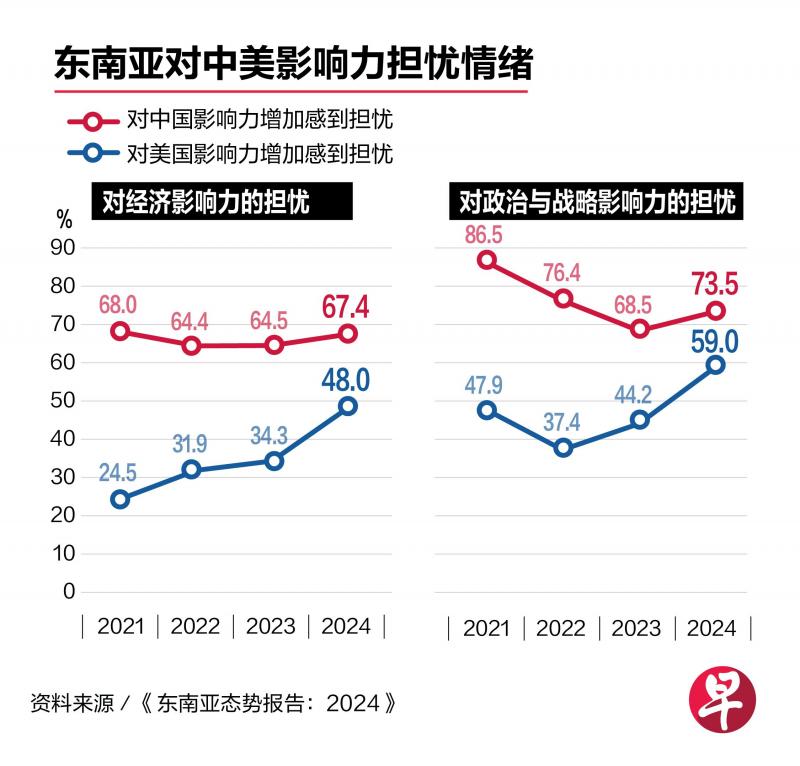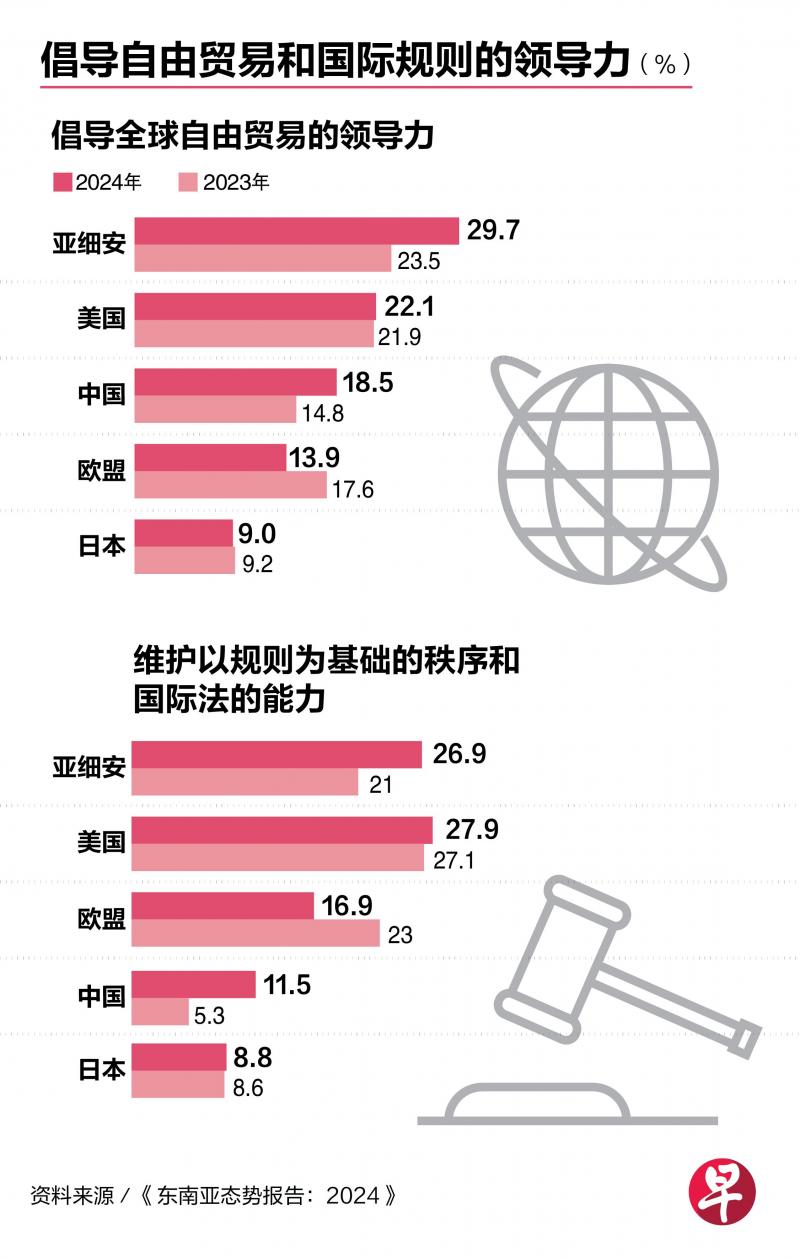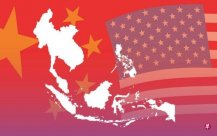
东南亚态势报告:2024星期二(4March 2) officially released.This is the sixth consecutive year of the Yashufi East South Asian Research Center of Singapore's Yusov Isa Easa Research Institute.The report concentratedly analyzed the perception and trust of Southeast Asia in China and the United States, and conducted an opinion survey on multiple high -profile Southeast Asian geopolitical issues.The following is the focus of the report compiled by Lianhe Zaobao.
China continues to be regarded as the most influential country in economy and politics. More than half of this year's interviewees are required to choose to choose between China and the United States.It's China.This is the first time that the number of people in China has surpassed the United States for many years.Most respondents believe that the relationship between Southeast Asian countries and China is better, and their confidence in the United States as a strategic partner and ensuring regional security has declined significantly.But whether it is in China or the United States, the degree of trust in Southeast Asian countries has declined.
In terms of geopolitical challenges, the Harbin conflict that broke out on October 7 last year occupied the attention of the region. Nearly half of the respondents in Southeast Asian countries are currently paying most attention to the situation in the situation.Other watched geopolitical challenges are the South China Sea subject (39.9 %), as well as the Russian and Ukraine War (39.4 %) and global fraud (39.4 %).
A total of 1994 people participated in the Southeast Asian situation: The State of Southeast Asia 2024.They come from the academic and think tanks, business circles, civil organizations, NGOs and media, government departments, and regional and international institutions in the ten nations of Asia.The survey began from January 3 to February 23 this year, and all interviewees answered questionnaires online.The research team has tightened the participation qualification requirements this year, and the interviewees must show certain understanding of Asian's detailed affairs and current affairs.When calculating the results of the investigation, the number of interviewees in each country accounts for the same proportion regardless of the number of interviewees, to reflect the principle of the right to speak equal speaking.
Part 1: Hot issues that Southeast Asia follow
> The fire of the Harbin conflict has not been extinguished, and it has attracted the most attention of Southeast Asian countries in many geopolitical challenges.Nearly 60 % of the interviewees are worried that the conflict will stimulate extremist activities in the region, impact domestic and regional security, and weaken trust in international law and rules -based order.
About 40 % of the respondents believed that Israel's attack on the Gaza Strip was too happy.Brunei, Indonesia and Malaysia with many Muslims have the strongest feelings about this.
The problem of habits caused a bipolar response in many countries.In Southeast Asia, 42.9 % of the respondents agreed with their national government's position on the issue of Harbin, and only 14.1 % opposed it.Among them, Indonesia (78.1 %), Brunei (64.9 %), Malaysia (58.7 %) and Singapore (57.1 %) governments have received the most support for domestic people.


2. Pay attention to Taiwan issues low
ComparedFor hot and geopolitical events, only 7.6 % of the respondents listed the influence of Taiwan elections in 2024 as their most concerned topic.
If there is a conflict between the Taiwan Strait, the people in Southeast Asia are most worried about the economic impact that the conflict may bring. More than 40 %The strongest country is Vietnam.Another 25 % of interviewees are worried that Southeast Asia will be forced to choose between China and the United States.
This year's respondents have a gentle attitude towards the situation of the Taiwan Strait.Nearly half of the respondents still believe that the use of force should be opposed through diplomatic means.The ratio of respondents who supported a neutral position rose from 33.5 % in 2023 to 36.5 %.The proportion of respondents who believed that the invaders would implement sanctions and the proportion of respondents who facilitated military support for Taiwan were reduced from 11.9 % and 6.3 % to 9.8 % and 5.7 %, respectively.
 Three. Worried about the impact on the economic impact of the Russian and Ukraine WarIncrement
Three. Worried about the impact on the economic impact of the Russian and Ukraine WarIncrement The Russia -Uko -war far away in Europe continues to affect Southeast Asia.The concerns of the influence on the battle are mainly reflected at the economic level. More than two of each of them (68.4 %) are worried that energy and food prices may rise and cause economic difficulties, which is 10.1 percentage points more than a year ago.
14.5 % of the respondents also pay attention to the trust of the Russian and Ukraine war weakening the international order based on rules and the infringement of national sovereignty.Among them, one of Singapore's four respondents (25.6 %) expressed concern about this, accounting for the highest proportion among all Asian member states, reflecting the principle of Singapore's principle of international law on the issue of the Ukraine War.
 4.The Qualification of the Asian Security Conference
4.The Qualification of the Asian Security Conference Myanmar turmoil has been criticized as the weakness of Asianan, and the interviewees have no consensus on how to resolve this problem.This year's report first listed the "restoring the Myanmar military government's participation in the Asian Simpan Conference to continue to implement the five -point consensus" as the option.This plan has obtained the most support (16.4 %) in Cambodia, and the lowest support rate in Laos bordering Myanmar and the chairman of the Asian Wheel value this year (3.8 %).
The most supported by the interviewees is individual dialogue with the parties, including the "national unity government", which is the support of 38.6 % of the respondents.
Other options have not received more than 15 % support. They are "adopting more tough means to effectively curb the military government" (14.9 %) "the coordinated and unified response plan with international partners" (13 %)"Not interference" (12.7 %) and "relegation/restrictions on contact with the military government" (12.5 %).
For the five -point consensus designed to promote the national reconciliation of Myanmar, more than 50 % of the respondents are not optimistic. They believe that it is impossible to solve the complex problems of Myanmar and it is difficult to play, and it exposes the unity of Asian security.Only 15.8 % recognize that this is the most appropriate choice under the current situation.
Part 2: The influence of the great country in Southeast Asia
/Strong>
China relaxed the prevention policy of epidemic prevention last year and focused on strengthening foreign economic and trade exchanges, but failed to reverse the trend of declining economic influence in Southeast Asia.Following the sharp decline in economic influence in last year, China's economic influence in Southeast Asia has further dropped slightly to 59.5 % this year.However, compared with other countries, China's economic influence is still far ahead.
The economic influence of the United States has maintained a slight upward trend since the Bidai government took office in 2021.This year, the ratio of the United States with the most economic influence in the region has further increased from 10.5 % to 14.3 %.
In terms of political and strategic influence, the ratio of the most influential respondents in China rose from 41.5 % last year to 43.9 %.The most political and strategic influence in the United States fell to 25.8 % after rising to 31.9 % last year.
 2. Worried concerns on the influence on China and the United StatesStepping
2. Worried concerns on the influence on China and the United StatesStepping The continuous geopolitical game of China and the United States has made the people in Southeast Asian feel anxious. This year, more people are worried about the economic and political influence of China and the United States in the region.
Those who are worried about China's economic and political and strategic influence are 67.4%and 73.5%, respectively, much higher than 32.6%and 26.5%of the welcomes.
The ratio of concerns about the influence of US politics and strategic influence also increased from 44.2 % to 59 % this year; although the concerns of the U.S. economic influence also increased to 48 %, the welcome person (52 %) still more.

Three.Become the preferred
If you are forced to choose the border station between China and the United States, more interviewees have chosen China this year; this is the first time that China has surpassed the United States since the investigation and addition of this issue in 2020.Become the first choice.However, China's advantage is small, only 1 percentage point than choosing the United States.
From the perspective of individual countries, Malaysia, Indonesia, and Laos, which have benefited from the China Belt and Road Initiative, are the most obvious tendency to further tend to China.The ratio of Malaysia and Indonesia in China increased by about 20 percentage points and exceeded 70 %. Laos was a "conversion camp", and it turned from the United States to 70 % from last year to China.
Among the Southeast Asian countries in the United States, the most interviewees tend to the United States is the Philippines that have sharp sovereignty in the South China Sea and China.
 Four. The overall trust of the great power
Four. The overall trust of the great power The trust of Southeast Asian countries has declined in a comprehensive trust in large powers, which is the only exception to Japan.Japan continued to sit in Southeast Asia's most trusted crowns, and later was the United States, the European Union, China and India.
Although the United States is the second largest country in Southeast Asian countries, the trust in the United States has decreased sharply from 54.2 % last year to 42.4 %.Those who still trust the United States believe that the United States has a huge economic resources and political willingness to do the right thing, but because they are worried that the domestic situation will make the US government distraction, the unwanted person will increase.
The situation in the South China Sea has exacerbated the uneasiness of the Asian safe country to China.Except for Laos, in every country in Ya'an, people who do not trust China are more trustworthy than trust.Among them, the highest trust in China is the Philippines, Myanmar and Vietnam.
 Part 3 part: Ayanian and Sino-US relations and Sino-US relationsOutlook
Part 3 part: Ayanian and Sino-US relations and Sino-US relationsOutlook 1. Optimistic about the development of relations with China
Southeast Asian interviewees are optimistic about the prospects of relations with China and think that they belongThe country's relations with China will improve or significantly improved from China in the next three years, from 38.7 % last year to more than 50 %.
But among these respondents who are optimistic about the prospects, 38.5 % and 37.2 % respectively believe that China ’s increasing economic dominance and political influence in Southeast Asian countries, as well as the hardness of the South China Sea and the Mekong River.The wrist may decline China's image.
Echoing is that 67 % of the respondents who are not optimistic about their own countries and China have believed that China must resolve sovereignty disputes in accordance with international law and peace, and they can change China.It is called on China to respect the sovereignty of other countries and not try to limit other foreign policy.
Decreased confidence
As the United States enters the presidential election year, more interviewees believe that the United States has reduced the participation of regional affairs.
It is believed that the United States reduces or significantly reduces the participants in regional affairs from 25.7 % last year to 38.2 %; the respondents who believe that the United States increased or significantly increased from participation decreased from 39.4 % last year's 39.4 % last year.To 25.2 %.
This then impacted the interviewees' confidence in the United States as a reliable regional security partner.The ratio of interviewees with only one or no confidence in the United States, from 32 % last year to 40.1 %.Indonesia, Brunei, and Malaysia are particularly confident in the United States, and more than half.
 Three, Southeast Asia actively treats QUAD and human destiny.Community
Three, Southeast Asia actively treats QUAD and human destiny.Community The security framework and cooperation ideas proposed by regional partners have been actively responded to Southeast Asian countries.It is believed that the US -Japan -India -Australian Sifang Security Dialogue (QUAD) has 40.9 % of the beneficial respondents in this area, an increase of nearly 10 percentage points from last year.About one -third of the respondents (32.2 %) believe that QUAD and Asia's efforts are complemented, but there are also a few people worry that this is considered to check the security framework that is considered to check in China.Angry China (7.4 %).
The constructive community of human destiny proposed in 2013 was also recognized by respondents in Southeast Asia.31.3 % of the interviewees believe that this idea is complementary with the direction of the efforts of Asians, and 30.1 % believe that it will be beneficial to Southeast Asia and bring a positive effect.However, 18.6 % of the respondents believe that this concept may cause differentiation and forced regional countries to choose border stations. 13.1 % believe that it will threaten the status of Asia Safe Center, and 6.8 % even think that this concept is meaningless to its country.
Fourth, the lack of confidence in the Indo -Pacific Economic framework of the United States
Actively treat the ratio of the Indo -Pacific Economic Framework (IPEF).Humans have doubts about the effectiveness of this framework.
Among the respondents who felt uncertain about iPEF, 32.6 % said that they were not interested in it. 27.9 % believed that the effectiveness of the initiative depends on China's checks and balances, and 20.6 % believe it does not further open the US market for Southeast Asian countries.18.9 % believe that the cost involved is greater than the income.
The respondents who actively look at the Indo -Pacific Economic framework mainly believe that it complements it (30.0%) with the existing plans of Asians, which will help improve global trade and investment (22.9%).Relational appreciation (19.8%), and shows that the United States is committed to participating in regional affairs (27.3%) economically.
I. The more important leadership of Yaxian
Integrated competition between China and the United States, as well as the background of people's trust in great powersBelow, the people of Southeast Asia pay more and more attention to Asia's own regional leadership.
In terms of advocating global free trade, Ayanan continues to be regarded as the most leading regional organization.29.7 % of the respondents are the most confident in Ya'an, which is 6.2 percentage points higher than last year.Ayan's economic influence in the region is even considered more than the United States.
In terms of maintaining rules -based order and international law capabilities, Asianan also replaces the EU, ranked second among many big countries, and is only one percentage point as the United States.

2. Singapore is considered a contribution to Asian Da'an Asian Dian'an.The biggest member states
Singapore and Indonesia are regarded as the two member states of the Asian Simonan member states to contribute to the long -term development and progress of Asia in Asia.Singapore and Indonesia were affirmed by 66 % and 41.5 % respectively.Not



